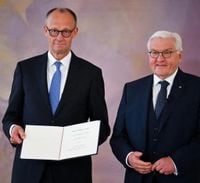On May 6, 2025, Friedrich Merz was officially appointed as Chancellor of Germany during a ceremony at Bellevue Palace, the official residence of the President of Germany. This marked a significant political moment, as Merz, leader of the Christian Democratic Union (CDU), took on the role after an initial failed attempt earlier the same day.
Initially, in the first round of voting, Merz garnered support from only 310 deputies, falling short of the required 316 votes needed for election. This unprecedented event marked the first time in German history that a candidate for Chancellor failed to secure the necessary majority in the first round.
Despite the setback, Merz persevered and, in the second round, he successfully received 325 votes, with 289 parliamentarians opposing his appointment. Following this vote, President Frank-Walter Steinmeier presented Merz with a certificate of appointment, officially confirming him as the new Chancellor.
During the ceremony, Merz took the oath of office in the Bundestag, notably concluding his oath with the words, "May God help me," a phrase that his predecessor Olaf Scholz had omitted during his own swearing-in. This distinction highlighted Merz's Catholic background, contrasting with Scholz's secular approach.
As Chancellor, Merz will lead a coalition government formed with the Social Democratic Party of Germany (SPD), which is set to include key positions within the government. The SPD leader, Lars Klingbeil, is expected to assume the role of Vice Chancellor, reflecting a partnership between the two major political factions.
The coalition emerged after the CDU/CSU bloc won the most seats in the Bundestag elections held on February 23, 2025, securing 28.6% of the votes. The ultra-right Alternative for Germany party followed with 20.8%, while the SPD trailed with 16.4%. The Greens, who received 11.6%, indicated their reluctance to support Merz's candidacy during the voting process.
After the formal appointment, all 17 ministers of Merz's federal government were also officially appointed. Five of these ministers are from the CDU, while three represent the Christian Social Union (CSU). The SPD will fill the remaining ministerial posts, further solidifying the coalition's structure.
As the political landscape in Germany continues to evolve, Merz's leadership will be closely watched, particularly in light of the challenges facing the nation, including economic recovery and social cohesion. His government is expected to navigate these complexities while balancing the interests of the coalition partners.
In a statement following his appointment, Merz expressed gratitude for the trust placed in him and emphasized his commitment to fostering a strong and united Germany. He acknowledged the challenges ahead but remained optimistic about the coalition's potential to deliver effective governance.
As Germany embarks on this new chapter under Merz's leadership, the implications of his policies and decisions will undoubtedly resonate across Europe and beyond, as the country plays a pivotal role in shaping continental politics.
With a focus on collaboration and unity, Merz aims to lead Germany through these transformative times, ensuring that the nation's interests are prioritized in both domestic and international arenas.





